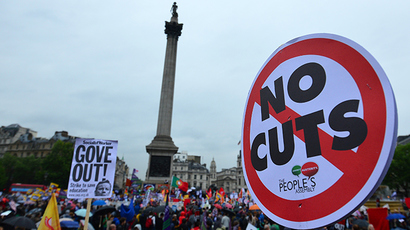1.1 million UK households could be in ‘debt peril’ by 2018

A modest increase in interest rates could render almost 25 percent of UK households in severe financial stress, according to a report published on Thursday. The Bank of England (BOE) has confirmed that such rate hikes are imminent.
High levels of household debt – resulting from consecutive years of easy credit – mean even a moderate rise in interest rates could create profound financial struggle for one in four households in the UK which will be simply unable to sustain their mortgages, a report from the Resolution Foundation (RF) reveals.
The RF, an economic policy think-tank intent on improving the standard of living for 15 million Britons on low and middle incomes, warns that Britain’s “household debt hangover” must be prioritized as the “holiday period” of low borrowing costs comes to a close.
The think-tank's concerns are compounded by the governor of the Bank of England’s cautionary claim on Wednesday that household debt is a “major risk” to the UK economy, and could drive Britain back into recession when interest rates rise.
Bank of England governor Mark Carney noted that many UK families are financially vulnerable, having overstretched their budget to get on the property ladder. A significant rise in loan or mortgage rates would impact on public spending, reversing the economy’s recent upward trend, he said.
If interest rates remain low for a prolonged period, Carney believes Britain’s housing market could become dangerously over-inflated. In a stern warning to borrowers, the governor confirmed that the first increase in interest rates Britain has seen since 2007 is imminent – irrespective of related risks.
“The UK economy is starting to head back to normal,” the governor stated. “As the economy normalizes, Bank Rate will need to start to rise,” he continued.
Carney assured the BOE will introduce interest rate rises in a “gradual and limited” fashion. Such an approach will soften the impact for severely indebted borrowers, he claimed.
But the governor cautioned that dramatic hikes in interest rates which occur more rapidly than predicted could “tip the economy into recession” because citizens who are experiencing financial strain will limit their spending elsewhere to sustain their mortgages.
Carney highlights that it is the prospect for excessive levels of “household indebtedness” that deeply concerns the Bank.
“If a lot of people are highly indebted, that could tip the economy into recession. Since we start from a vulnerable position we need to be especially careful,” he said.
The governor warned that with household debt equating to 140 percent of Britons' disposable income, interest rates will remain “materially lower” than the five percent average that foregrounded the financial crisis. Such acute indebtedness is “a major risk” to the nation’s economic stability, he claimed.

Despite a five year run of exceptionally low interest rates, many UK mortgage holders have struggled to pay their debts as a result of a troubled jobs market and very low wage growth, according to the RF.
Interest rates have been fixed at a steady low of 0.5 percent since the most severe period of the Great Recession in 2009. But the UK is currently reported to be the fastest growing advanced economy in the world, with a rapidly expanding job market. Consequently, many experts and commentators claim a stark rise in UK rates is inevitable.
Reflecting on the precarity of Britain's economic recovery, Carney said: “The Bank is well aware that a prolonged period of historically low interest rates could encourage other risks to develop. In the UK, the biggest risks are associated with the housing market.”
Britain has a history of high levels of debt.
"The country’s stock of private and public sector debt nearly tripled from 165 percent of GDP in 1987 to 466 percent in 2008, and the UK stood as one of the most indebted countries in theworld as the recession unfolded,” the Resolution Foundation’s report reveals.
And six years later, little has changed.
The think-tank argues that the number of UK mortgage holders spending more than 33 percent of their income on debt repayments could skyrocket from 1.1 million today to 2.3 million by 2018.
More alarmingly, the number of UK households in "debt peril" – meaning they are allocating more than 50 percent of their income on mortgage repayments – could mushroom from 600,000 to 1.1 million by 2018, according to the report.
When asked on Wednesday whether the first rise in interest rates could be expected soon, Carney declined to give details.














